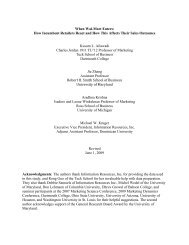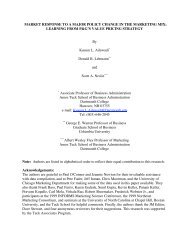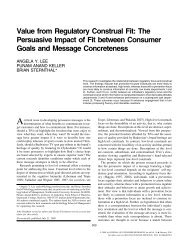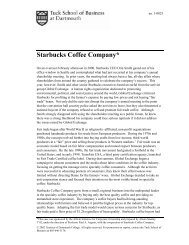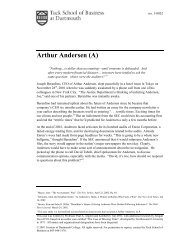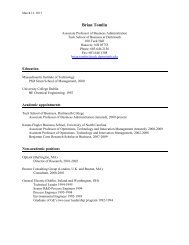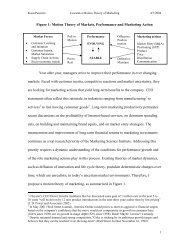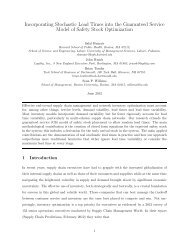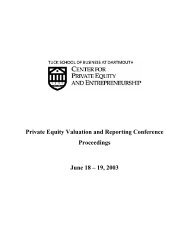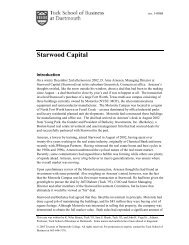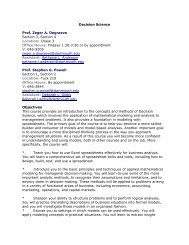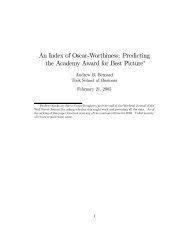tax notes international - Tuck School of Business - Dartmouth College
tax notes international - Tuck School of Business - Dartmouth College
tax notes international - Tuck School of Business - Dartmouth College
You also want an ePaper? Increase the reach of your titles
YUMPU automatically turns print PDFs into web optimized ePapers that Google loves.
that must be satisfied before a country can <strong>tax</strong> residents<br />
<strong>of</strong> other treaty countries on their pr<strong>of</strong>its derived<br />
from the other country.’’ 12<br />
At this stage, it is worthwhile to remember what<br />
Kees van Raad cited as one <strong>of</strong> the fundamental rules<br />
in applying <strong>tax</strong> treaties, that ‘‘<strong>tax</strong> treaties restrict the<br />
application <strong>of</strong> internal <strong>tax</strong> law.’’ 13 Stated differently, a<br />
<strong>tax</strong> treaty might restrict <strong>tax</strong>ation, but not impose a <strong>tax</strong><br />
that does not otherwise exist under domestic law. The<br />
main purpose <strong>of</strong> <strong>tax</strong> treaties is to establish a mechanism<br />
to avoid double <strong>tax</strong>ation by restricting <strong>tax</strong> claims<br />
in areas where overlapping <strong>tax</strong> claims are expected to<br />
occur. 14<br />
In this sense, the PE threshold must be met to allow<br />
the host state to <strong>tax</strong> the items <strong>of</strong> income arising within<br />
its territory, if its domestic law so provides. Broadly<br />
speaking, the rationale behind the PE provision is that<br />
as the enterprise is deriving pr<strong>of</strong>its in the host state by<br />
having a presence there<strong>of</strong>, that is, by being economically<br />
connected with that state and using its infrastructure,<br />
the host state should be entitled to <strong>tax</strong> such<br />
pr<strong>of</strong>its.<br />
The characterization <strong>of</strong> a PE is governed by article<br />
5, provided that the relevant states concluded an<br />
OECD-patterned treaty. For the present analysis, what<br />
is relevant is the characterization <strong>of</strong> an agency PE,<br />
which is governed by the provisions <strong>of</strong> article 5, paragraph<br />
5 <strong>of</strong> the OECD model <strong>tax</strong> convention.<br />
The first use <strong>of</strong> article 5, paragraph 5 in a model<br />
dates back to the 1935 League <strong>of</strong> Nations draft. 15 The<br />
underlying principle <strong>of</strong> this provision is that a person<br />
acting on behalf <strong>of</strong> the enterprise in the host state<br />
leads to a <strong>tax</strong>able presence there<strong>of</strong>, that is, a PE, even<br />
though the enterprise may not have a fixed place <strong>of</strong><br />
business in that state in the sense <strong>of</strong> paragraphs 1 and<br />
2 <strong>of</strong> article 5. 16 This particular feature <strong>of</strong> the agency<br />
PE — irrelevance <strong>of</strong> a fixed place <strong>of</strong> business — illustrates<br />
the difficulty in characterizing such a PE in practice,<br />
as opposed to the physical PE set forth in article<br />
5, paragraphs 1 and 2. While the characterization <strong>of</strong><br />
the latter type is rather obvious, <strong>tax</strong> authorities face a<br />
more difficult task in identifying agency PEs because <strong>of</strong><br />
12<br />
Brian J. Arnold, ‘‘Threshold Requirements for Taxing <strong>Business</strong><br />
Pr<strong>of</strong>its Under Tax Treaties,’’ Bulletin — Tax Treaty Monitor<br />
(Oct. 2003), pp. 476-492.<br />
13<br />
Kees van Raad, ‘‘Five Fundamental Rules in Applying Tax<br />
Treaties,’’ Liber Amicorum Luc Hinnekens (Bruxelles: Bruylant,<br />
2002), pp. 587-597.<br />
14<br />
Vogel, supra note 3, at 27.<br />
15 John F. Avery Jones et al., ‘‘The Origins <strong>of</strong> Concepts and<br />
Expressions Used in the OECD Model and Their Adoption by<br />
States,’’ Bulletin — Tax Treaty Monitor (June 2006), p. 237.<br />
16 Vogel, supra note 3, at 329.<br />
the need to focus on the activities <strong>of</strong> the enterprise as<br />
carried out by the dependent agent. 17<br />
Under article 5, paragraph 5 <strong>of</strong> the OECD model<br />
<strong>tax</strong> convention, an agency PE is found to exist when<br />
the following characteristics are met: (i) a person (individual<br />
or company) is acting on behalf <strong>of</strong> the enterprise,<br />
(ii) other than an agent <strong>of</strong> independent status,<br />
(iii) with authority to conclude contracts, (iv) in the<br />
name <strong>of</strong> the enterprise, (v) on a regular basis. In the<br />
OECD language, as long as these requirements are<br />
met, the agency PE is characterized a dependent agent<br />
(DA) and a dependent agent PE (DAPE). There are<br />
countless debatable questions in connection with each<br />
<strong>of</strong> these requirements, all <strong>of</strong> which, however, fall outside<br />
the scope <strong>of</strong> this article. 18 For the purposes <strong>of</strong> this<br />
article, it is assumed that every time an agency PE is<br />
mentioned, the requirements at stake were met.<br />
In this context, though this is not the core issue <strong>of</strong><br />
this article, the scope <strong>of</strong> article 5, paragraphs 5 and 6<br />
<strong>of</strong> the OECD model convention is quite disputable<br />
among scholars, especially when it comes to the difference<br />
between common-law and civil-law practitioners.<br />
From a common-law perspective, it is <strong>of</strong>ten argued that<br />
article 5, paragraphs 5 and 6 cover only agents concluding<br />
contracts binding on their principal. 19 However,<br />
a different view based on civil law is that article 5(5) <strong>of</strong><br />
the OECD model convention refers to direct representatives,<br />
while article 5(6) relates to indirect representatives.<br />
20 These diverse views reflect the essential difference<br />
between common and civil law:<br />
When an agent makes a contract in his own<br />
name, but on behalf <strong>of</strong> an undisclosed principal,<br />
as a general rule under common law, the principal<br />
is bound by the contract, whereas under civil<br />
law, again as a general rule, only the agent, and<br />
not the principal, is bound by such a contract. 21<br />
This difference between common and civil law is<br />
<strong>of</strong>ten viewed as a <strong>tax</strong> planning opportunity. Multinational<br />
enterprises will take into account all the abovementioned<br />
factors that characterize an agency PE<br />
when setting up a business abroad. Under their supply<br />
chain management and <strong>international</strong> <strong>tax</strong> planning strategy,<br />
multinational enterprises will <strong>of</strong>ten seek to structure<br />
their activities in a foreign country in a manner<br />
17 Arnold, supra note 12, at 479.<br />
18 For reference to the controversial issues involving the<br />
agency PE notion, see Giuseppe Persico, ‘‘Agency Permanent<br />
Establishment Under Article 5 <strong>of</strong> the OECD Model Convention,’’<br />
Inter<strong>tax</strong>, Vol. 28, No. 2 (2000), pp. 66-82.<br />
19 John F. Avery Jones and David A. Ward, ‘‘Agents as Permanent<br />
Establishments Under the OECD Model Tax Convention,’’<br />
Eur. Tax’n (May 1993), pp. 154-181.<br />
20 Sidney I. Roberts, ‘‘The Agency Element <strong>of</strong> Permanent Establishment:<br />
The OECD Commentaries From the Civil Law<br />
View,’’ Eur. Tax’n (Mar. 2008), pp. 107-113.<br />
21 Avery Jones and Ward, supra note 19, at 156.<br />
SPECIAL REPORTS<br />
TAX NOTES INTERNATIONAL FEBRUARY 2, 2009 • 423<br />
(C) Tax Analysts 2009. All rights reserved. Tax Analysts does not claim copyright in any public domain or third party content.



